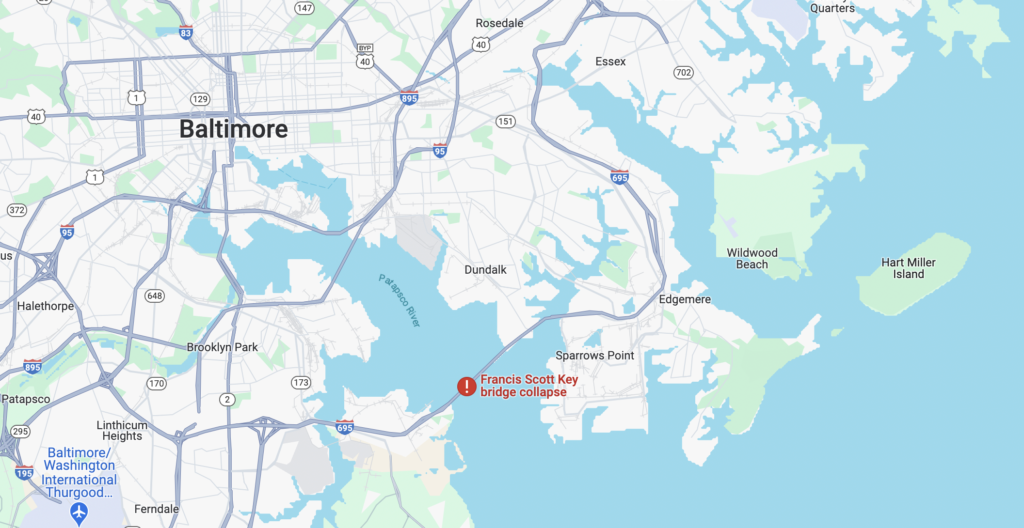The collapse of the Francis Scott Key bridge in Baltimore, Maryland, on Tuesday could significantly disrupt American shipping.
The bridge collapsed early Tuesday morning when a Sri Lanka-bound cargo ship collided with a supporting pillar, and ship traffic into and out of the Port of Baltimore has been suspended indefinitely while rescue and repair efforts are made, according to The Baltimore Sun. The Port of Baltimore processes billions of dollars of commerce each year and is a key port for American coal exports; officials have already made clear that the collapse will disrupt trade coming in and out of the port for the foreseeable future. (RELATED: Global Trade Falls As Traffic Through The Red Sea Plummets After Attacks)
A map of Baltimore shows how the location of the collapsed Francis Scott Key Bridge will impede commercial vessels that would otherwise look to enter or exit the port. (Screenshot via Google Maps)
“This is a major disaster and will create significant problems on the U.S. East Coast for U.S. importers and exporters,” Lars Jensen, CEO of Vespucci Maritime, wrote in a post on LinkedIn. “The bridge collapse will mean that for the time being it will not be possible to get to the container terminals – or a range of the other port terminals — in Baltimore. … Additionally this means the cargo already gated into the Baltimore terminals would have to either wait an unknown period for the sealane to reopen, or be gated back out and shifted to a different port.”
“It appears the Norfolk and [New York and New Jersey] combined does have sufficient capacity to take the spill-over from Baltimore,” Jensen added. “Of course not without some disruptive effects as none of this is pre-planned into the supply chains and hence some bottleneck effects and delays are to be anticipated in the short term. For Baltimore and immediate surrounding (areas) the impact on supply chains will of course be extremely large.”
The Port of Baltimore handled about 20% of all American coal exports in 2022, making it the second-largest coal exporting location in the U.S. behind the Port of Norfolk, Virginia, according to the U.S. Energy Information Administration. Beyond coal, the Port of Baltimore saw 52 million tons of cargo worth about $80 billion come in from foreign exporters in 2022, according to the office of Democratic Maryland Gov. Wes Moore.
INSANE video of Baltimore bridge collapse
pic.twitter.com/8ZdwMqsq7M— Nicole Silverio (@NicoleMSilverio) March 26, 2024
The closure of the bridge and the consequent blockage of the Port of Baltimore “will inevitably disrupt commercial activities and supply chains,” the Maryland Chamber of Commerce explained in a statement addressing the bridge collapse. “Understanding the monumental task ahead to recover from this tragedy and restore this vital transportation link, we urge all residents and businesses to exercise patience and make the necessary long-term adjustments to their daily routines, travel and operations.”
The Port of Baltimore is one of the ten busiest ports in the U.S. by volume of foreign cargo received and the value of that foreign cargo, according to Barron’s. Beyond its high share of American coal exports, the Port of Baltimore also handles the most cars and light trucks out of any port in the U.S., and it also receives the most imported sugar and gypsum.
All content created by the Daily Caller News Foundation, an independent and nonpartisan newswire service, is available without charge to any legitimate news publisher that can provide a large audience. All republished articles must include our logo, our reporter’s byline and their DCNF affiliation. For any questions about our guidelines or partnering with us, please contact licensing@dailycallernewsfoundation.org.


